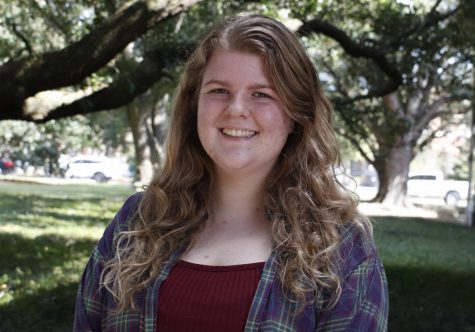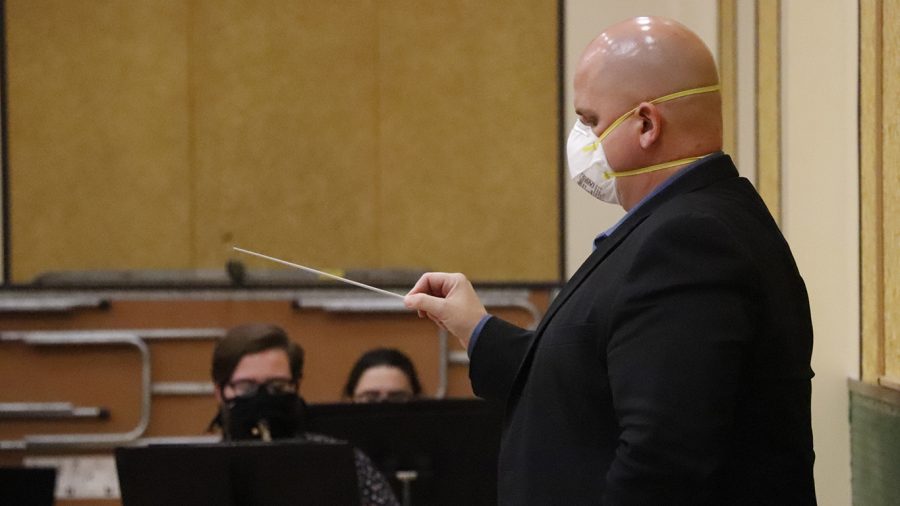Wind symphony to livestream Fanfare concert “Inspirations and Influences”
Brynn Lundy/The Lion’s Roar
Wind Symphony director Victor Drescher leads a socially-distanced rehearsal. Drescher came to the university in 2013 and serves as an instructor of clarinet in addition to directing the Wind Symphony.
While a pandemic may be changing the way the arts are being enjoyed, it is not necessarily bringing them to a halt.
The Wind Symphony’s performance of “Inspirations and Influences” was originally scheduled at the Columbia Theatre for the Performing Arts. However, due to phase three restrictions, the concert will now be streamed through KSLU’s Facebook page on Tuesday, Oct. 20 at 7:30 p.m.
The concert will feature four pieces: “America, the Beautiful” written by Samuel Ward and arranged by Carmen Dragon, “Children’s March” by Percy Grainger, “A Movement for Rosa” by Mark Camphouse and “A Mother of A Revolution!” by Omar Thomas.
Victor Drescher, director of the wind symphony, explained the title of the performance as well as why he chose to include these pieces.
“I titled the Wind Symphony’s concert ‘Inspirations and Influences’ because, with current events across our country, I felt we could all honestly use some inspiration,” shared Drescher. “I have picked a short, but diverse, program of pieces for this concert that are all inspiring or meaningful in some way. I decided to open with Samuel Ward’s ‘America, the Beautiful,’ masterfully arranged for wind band by Carmen Dragon, as a way to celebrate every American’s opportunity to have a say in their government.”
The second piece, “Children’s March,” will be a tribute to one of Drescher’s mentors.
“One of my personal mentors, Frank Wickes, who was the conductor of the LSU band for 30 years, passed away this past May,” said Drescher. “I played clarinet in Dr. Wickes’ bands for seven years through three degrees, so he played a pivotal role in my journey as a musician and conductor. I thought an appropriate way to honor his memory would be for me to conduct a piece by one of his favorite composers that I performed under his baton as a student myself.”
The last two pieces are inspired by historical figures Rosa Parks and Marsha P. Johnson.
“Third on the program will be ‘A Movement for Rosa,’ a monumental work by composer Mark Camphouse in three distinct sections described by Camphouse himself: Rosa’s early years until her marriage, the years of racial strife in Montgomery and the quest for social equality and the final section that holds both the hymn ‘We Shall Overcome’, as well as an ominous reminder of racism’s lingering presence in modern American society,” explained Drescher. “Our final piece is titled ‘A Mother of A Revolution!’ by a rising star in wind band composition, Omar Thomas. Thomas himself is a composer of color and had this piece commissioned in commemoration of the 50th anniversary of the Stonewall Riots and honoring Marsha P. Johnson.”
Ryan Lafleur, a music performance graduate student and member of the wind symphony, mentioned that rehearsing during a pandemic has been possible due to the amount of responsibility he and his fellow performers have towards taking preventative safety measures.
“It feels like a dream,” noted Lafleur. “There was a little apprehension at first, but we’ve been distancing and folks stay home if there’s even a hint of being under the weather. It’s really reassuring to be able to have these rehearsals and performances, and there is definitely an element of mutual trust involved between colleagues.”
Since the concert will be streamed, Lafleur explained what that entails for performers who are used to playing for a live audience.
“With a performance, there’s definitely going to be some anxiety,” mentioned Lafleur. “In this case, a live-streamed, recorded performance means that your mistakes can be replayed. Nevertheless, it is cathartic to be performing, even if there is no live audience.”
Adrian Fonseca-Tellez, a music performance graduate student and member of the wind symphony, shared how music has continued to have an impact despite the pandemic.
“I know many people in the music industry that have lost their sources of income due to the closure of concert venues, restaurants, studios and businesses,” commented Fonseca-Tellez. “Although I fully understand and agree with the reasons behind these closures, it has adversely impacted both the music community and those who enjoy and support live performances. I adamantly believe that music is one of the most powerful sources of healing, one that is most necessary in these trying times, and even though the way we are able to transmit our music has changed, its importance has remained just as prevalent as before.”
Joshua Hebert, a junior music major and member of the wind symphony, described his previous experiences with Fanfare.
“Last year, our saxophone performed a piece called ‘October’ by Eric Whitacre,” shared Hebert. “It’s still one of my favorite performances I’ve done because we got to perform with our Professor of Saxophone Brina Bourliea. It’s not often to get to play with your teacher.”
Hebert also elaborated on the importance of music and performing during COVID-19.
“I think that music heals the heart in a way that words cannot,” said Hebert. “Right now, everyone is just doing the same ‘go to work, go home’ schedule. This concert, despite not having guests, will still break up that habitual nature and give people something to look forward to and get excited about.”
Your donation will support The Lion's Roar student journalists at Southeastern Louisiana University.
In addition, your contribution will allow us to cover our annual website hosting costs.
No gift is too small.

Maggie Tregre is an English education major from Baton Rouge, LA. She worked as a staff reporter and editor-in-training for The Lion's Roar from September...




